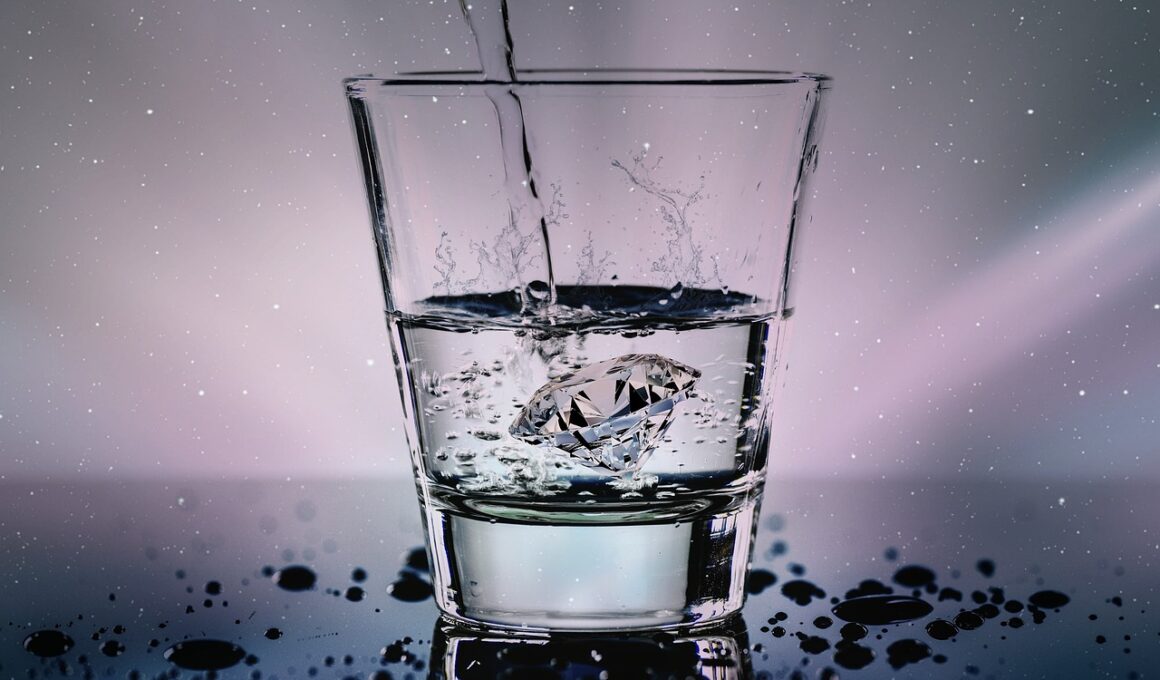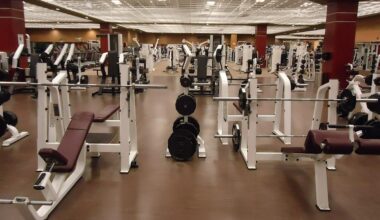How Sports Drinks Help Prevent Dehydration and Cramps
When engaging in physical activities, maintaining hydration is essential for optimal performance. Athletes often face the decision between choosing water or sports drinks. Sports drinks are formulated to replenish lost fluids and electrolytes during vigorous exercise. Unlike water, which primarily rehydrates, sports drinks contain carbohydrates and electrolytes that support endurance. This means they not only help hydrate but also provide energy that can prevent fatigue. Moreover, electrolytes like sodium and potassium help maintain fluid balance in the body. When sweat is lost during physical exertion, these electrolytes are crucial for sustaining muscle function. Rehydration becomes more effective when reintroducing both fluids and electrolytes, which are often missing in plain water. Therefore, integrating sports drinks can benefit athletes looking to enhance their hydration strategy, particularly during intense workouts. It is vital for athletes to ensure nutritional requirements are met through hydration. By choosing the right beverage, even endurance activities can become more manageable. Although water is sufficient for moderate exercise, those engaging in prolonged effort may result in better outcomes with sports drinks.
Sports drinks are not only beneficial for hydration but also play a significant role in preventing cramps. Cramps often occur due to dehydration or electrolyte imbalances during intense activities. Sodium, potassium, and magnesium present in sports drinks work together to minimize these issues. The rehydration process ensures that muscles receive adequate fluids needed to function properly. When dehydration occurs, the risk of muscle cramps increases significantly as responsiveness slows down. Thus, consuming sports drinks before, during, and after exercise can help maintain peak performance. As muscles contract during high-intensity workouts, the required nutrients need to be replenished. A common misconception is that cramping only affects elite athletes; however, anyone participating in rigorous sports can experience this discomfort. Addressing hydration with a sports drink can ultimately enhance overall sports performance. Moreover, a blend of carbohydrates helps maintain energy levels while minimizing fatigue. Athletes should be mindful of how they hydrate before and during sporting events. It’s essential for athletes to get familiar with their own hydration needs to avoid energy dips or muscle cramps.
There are several compositions of sports drinks available on the market today, each offering varying benefits. These drinks generally contain carbohydrates, electrolytes, and sometimes added vitamins. The carbohydrate content can range from low to high, depending on the intensity of exercise. For longer workouts, high-carbohydrate formulas are more beneficial, providing readily accessible energy. Electrolytes promote rapid absorption of fluids while ensuring that lost nutrients are replaced adequately. It’s paramount for athletes to select a drink that aligns with their exercise intensity. Some drinks may include additional flavorings or functional ingredients, such as branched-chain amino acids. Before committing to a specific brand or formula, athletes should examine ingredient lists carefully. It’s also valuable to consider the sugar content in a drink, as excessive sugar may hinder performance rather than enhance it. Several research studies recommend specific ratios of sugar to electrolytes for optimal effectiveness. Body size, duration of exercise, and environmental conditions are factors influencing hydration needs. Athletes are encouraged to experiment with different types to resolve the best personal fit.
When to Choose Sports Drinks
Knowing when to choose sports drinks over water can greatly influence performance levels. During activities lasting over an hour, the body begins to lose vital electrolytes. As the intensity of exercise increases, rehydration becomes imperative. For activities involving heavy sweat, studies suggest a sports drink is preferable for optimal hydration. Immediate replenishment of fluids right after exercise is crucial to recovering from exertion. A good guideline is to assess sweat loss; if excessive, including sports drinks is wise. Even recreational athletes can benefit from the electrolytes that help restore the balance lost during workouts. Consuming water is adequate for short workouts lasting less than an hour, but for longer events, sports drinks should be considered. Hydration strategy should be individualized based on various conditions including climate and altitude. Environments that exacerbate fluid loss, like heat, call for more attention toward hydration. It is critical to drink before feeling thirsty, as thirst is an indicator that dehydration may already be present. This proactive approach can significantly enhance people’s overall performance and enjoyment during exercise.
Additionally, sports drinks often aid recovery after intense physical activity. Recovery is a critical aspect of training, that involves replenishing lost nutrients and fluids. After a strenuous workout, the body requires proper nutrition to rebuild and restore its energy levels. Sports drinks serve as a quick source of hydration along with essential carbohydrates. Drinking a sports drink post-exercise can help facilitate faster muscle repair and restoration. Research suggests athletes consuming electrolytes after workouts show better recovery rates than those who do not. Fluid balance becomes crucial in ensuring the muscles can recover optimally, minimizing delayed onset muscle soreness or DOMS. Staying ahead of hydration can reduce recovery time, allowing athletes to return to their regimes more quickly. Additionally, including protein along with electrolytes in recovery can further enhance outcomes. Combining various nutrients from sports drinks can be beneficial, ultimately leading to improved athletic performance. Effective recovery strategies are paramount, particularly in sports requiring sustained effort. Implementing proper hydration practices can lead athletes closer to their fitness goals efficiently and effectively.
Potential Downsides of Sports Drinks
Despite the numerous benefits of sports drinks, there are potential downsides that athletes must consider. One main concern is the high sugar content commonly found in these beverages. Frequent consumption of sugar-laden drinks can lead to unwanted weight gain and contribute to health issues like diabetes. Athletes looking to supplement their nutrition should balance their intake of sports drinks with overall dietary needs. Additionally, excessive consumption may lead to gastrointestinal discomfort for some individuals. These side effects underscore the importance of moderation. It is essential to read labels and make informed choices based on personal health goals and activities. Choosing low-calorie or natural options might circumvent some negative results. Just as water is indispensable, so is a sensible approach to sports drinks. Athletes must also be cautious about developing a dependence on sugary drinks for energy. Recognizing the signs when sports drinks are appropriate and healthy is vital for long-term success. Careful planning can facilitate healthier hydration strategies while maximizing athletic performance, ensuring that both water and sports drinks are used effectively and appropriately.
In conclusion, the debate surrounding sports drinks versus water reveals crucial insights for optimizing athletic performance. Sports drinks present unique benefits over water, notably for endurance athletes facing prolonged exertion. They assist with hydration, preventing cramps and muscle fatigue, which can undermine performance. Moreover, they facilitate recovery, restore energy, and replenish lost nutrients effectively. Athletes should evaluate their specific needs based on workout intensity, duration, and environmental conditions when choosing between these options. While water remains essential, sports drinks complement hydration strategies exceptionally well when engaged in rigorous activity. Research consistently shows that hydration is key to overall wellbeing, especially for athletes. By implementing appropriate hydration practices, athletes can enhance their performance, extending their endurance and enjoyment. Ultimately, a balanced approach involving both water and sports drinks can yield excellent outcomes for any individual pursuing sports. Individuals must stay educated about what works best for their bodies. Consisting of proper hydration practices, it will lead to improved results over time, preventing exhaustion and discomfort. Therefore, athletes should confidently make informed hydration choices that match their athletic endeavors.



